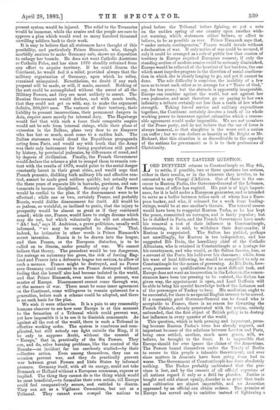THE NEXT EASTERN QUESTION.
T,ORD DUEPERIN returns to Constantinople on May 4th, to settle, if possible, two or three questions too serious, either in their results, or in the interests they involve, to be entrusted to any Charge d'Affaires. One of these is the suc- cessor to Rustem Pasha, the Governor-General of the Lebanon, whose term of office has expired. His post is of high import- ance, for it is held under a European guarantee, and is intended to serve as a buffer between tribes each of whom has a Euro- pean backer, and who, if released for a week from leading- strings, would be at one another's throats. The natural course
would have been to reappoint Rustem Pasha, as he has kept the peace, committed no outrages, and is fairly popular ; but he is disliked in Paris, and the French Government have made his removal a test of their influence in Constantinople, threatening, it is said, to withdraw their Ambassador, if Rustem is reappointed. The Sultan has yielded, perhaps not unwillingly, for Rustem is too independent, and has suggested Bib Doda, the hereditary chief of the Catholic
Albanians, who is retained in Constantinople as a hostage for his countrymen, and who would, as the Sultan fancies, lose, as a servant of the Porte, his hold over his clansmen ; while, from his want of local following, he would be compelled to rely on Constantinople for the means of governing. As Bib Doda, how- ever, possesses no qualifications for a most difficult task, and Europe does not want an insurrection in the Lebanon, the remon- strances have been too pressing to be resisted, the Sultan has given way, the appointment is open, and Lord Dufferin will be able to bring his special knowledge both of the Lebanon and of the personages of Turkey to bear. His mediation ought to be successful, for there is no special English interest to be served. If a reasonably good Governor-General can be found who is acceptable to France, there is no reason for thwarting the French Cabinet, already penetrated with the notion, entirely unfounded, that the first object of British policy is to destroy her influence in every quarter of the world.
This question, which is both pressing and important, press- ing because Rustem Pasha's term has already expired, and important because of the relations between London and Paris, being once settled, another, much more grave, will, we believe, be brought to the front. It is impossible that Europe should for ever ignore the claims of the Armenians. The Powers bound themselves under the Treaty of Berlin to secure to this people a tolerable Government, and ever since matters in Armenia have been going from bad to worse. The Government of Constantinople has done absolutely nothing. The Pashas probably understand that the pro- vince is lost, and by the consent of all official reporters of all nations regard it only as a field for plunder. Justice is bought and sold almost openly, disorder is BO great that trade and cultivation are almost impossible, and no Armenian oppressed by an official can obtain redress. The promise of Europe has served only to embitter instead of lightening a secular oppression, by inspiring the victims with hope and the oppressors with jealous fear. This situation must end, and it is most expedient that it should be ter- minated before Lord Dufferin quits Constantinople. The Turks know that he never gives way, that he has always succeeded, and that he is always supported to the full by his own Government ; while the Russians are aware that, for good and for evil, he understands them. Moreover, circumstances are not unfavourable to the settlement of a question which looks much more difficult than it is. Most of the European Powers care nothing about Armenia. They are willing to keep their word, willing also to protect a people who, as the only Christian nationality in Asia, greatly interest the cultivated, and they have no object whatever in supporting Turkey, but they are not disposed to expend either money or influence on behalf of the Armenians. Two Powers, however, are keenly interested in the Armenians, —the British, who wish them to be independent ; and the Russians, who, besides their sympathy for all Christians under Mussulman domination, would like greatly to reckon the whole race among their subjects. They respect the Armeni- ans, raise them to high commands, and are in return re- garded by them as of all Europeans their most trustworthy friends. All over Asia, from Constantinople to Pekin, the Armenians are friendly to Russia, and as they penetrate everywhere, being the only Christian people whom Asiatics fully recognise as non-European, and are everywhere among the cleverest of mankind, they are invaluable allies. If, therefore, these two Powers can agree, the field, as regards Europe, is clear, and their agreement is not impossible. If they quarrel, to begin with, nothing will be done, for the Sultan will pit one against the other ; while, if they agree, the pressure on the Palace will be irresistible. Then, there is no ground of quarrel. The Russian Government does not want to annex just now. It is overburdened with work, with diffi- culties, and with financial trouble, and would be content if only Armenia were permitted to govern itself. That also would content the British, and the autonomy of Armenians is con- sequently the object towards which both will be willing to struggle. No promise from the Porte is, in such a case, of the slightest value. No "reform," even if it were conceded, could remove the original difficulty, which is that the Armenians, as Christians, are not entitled under the "Holy Law" to equal justice, and, therefore, while Mussulmans govern the country, will not receive it. The Sultan himself could not make an Armenian's testimony as valid as that of a Mussul- man, and every Court of Justice is, therefore, the scene of a bad comedy. The only possible cure is autonomy ; and it is towards autonomy, either in its Roumelian form or in the form adopted in the Lebanon, that the two Governments will work. Even together they will have enough to do. The Sultan will contend for an Asiatic province as he would never contend for a European one. He has already lost Egypt and the Lebanon, and will fear lest another retreat in Asia should arouse new desires for freedom among the Mussulmans them- selves. He does not want to lose his hold over a race which hitherto has done what we may call the lawyer work for the dominant caste, or to see an autonomous State attracting away from every corner of the empire some of the most taxable of his subjects. He will be afraid of the Ottomans, on whom his throne rests, and who all believe that to surrender a conquered State without any compulsion on the field is an impiety, as well as a disgrace. He will yield, we may be sure, only to pressure, but still the pressure may be sharp. The English Government cannot fight to keep Armenians in slavery, and the Russian Government can, there- fore, threaten force, which, as the Sultan knows, could be very readily applied. Russia in this instance has no Rou- manian permission to ask before she crosses the frontier, and no Danube to separate her from her foe. Turkey, with her finances all disorganised, her functionaries unpaid, and her soldiers ill supplied, is in no position to declare war, while a pitched battle lost in Armenia might shake down the Sultan's throne. The sovereignty over the principality, though it would be but nominal, would not be given up, and Armenia, once set free, could afford a tribute which would be a welcome relief to the Sultan's impoverished exchequer. It may be neces- sary to apply pressure in a very decided form, but the Sultan must give way in the end, as he did about Montenegro, about Thessaly, and about Egypt, and after three months of bitter negotiation, Armenia would be free. That would be a result worth a struggle, which Lord Dufferin, with his knowledge of St. Petersburg and Constantinople, and his special experience of such struggles, may be able to avert, though we cannot flatter ourselves, with the Times, that mere conversation will have any weight with the Sultan. No man yet was ever talked out of an estate, and stubbornness is not the quality in which Turks are apt to be deficient. The talk, however, will explain British objects, and Lord Dufferin will have this ad- vantage, that for once even the Sultan cannot suspect the British of interested motives. Armenia has no Bonds—or she would be free by this time—and no Canal.



































 Previous page
Previous page